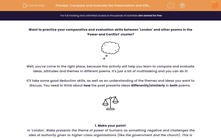Want to practice your comparative and evaluation skills between 'London' and other poems in the 'Power and Conflict' cluster?

Well, you've come to the right place, because this activity will help you learn to compare and evaluate ideas, attitudes and themes in different poems. It's just a bit of multitasking and you can do it!
It'll take some good deduction skills, as well as an understanding of the themes and ideas you want to discuss. You need to think about how the poet presents ideas differently/similarly in both poems.

1. Make your point!
In 'London', Blake presents the theme of power of humans as something negative and challenges the idea of authority given to higher-class organisations (like the government and the church). This is emphasised through the quote "how the Chimney-sweepers cry, every blackning church appalls'" The present-tense verbs "cry" and "appalls" highlights the corruption in society and shows the power given to the church, causing the innocent lower-class citizens (the chimney-sweepers) to suffer.
2. Link to another poem!
Similarly, in 'Checking Out Me History', Agard challenges the theme of power of humans, presenting it in a negative light. The metaphor "bandage up me eye with me own history" shows the controlling nature of those in authority and highlights how certain parts of history are hidden.
3. Compare!
These poems compare in terms of the power of humans. In both poems, the idea that authoritative figures have complete power over the entire population is presented. However, 'Checking Out Me History' ends on a more positive note- there is a sense of defiance against the authority and, instead, the speaker is "carving out" his identity. 'London' ends on a negative note, which gives a reader the impression that change cannot happen.
4. Evaluate
Both 'London' and 'Checking Out Me History' challenge the power of humans, especially those in authority. They both highlight the negative effects of concentrated human power, making the reader aware of corruption in society. The poems, however, differ in terms of solutions. While 'Checking Out Me History' leaves the reader with an idea that change in society is possible, 'London' contradicts this idea and emphasises the fact that change is no longer possible.
A tip: it'll help to jot down any new/helpful advice you get given in this activity!
You should always refer to your own text when working through these examples. These quotations are for reference only.







